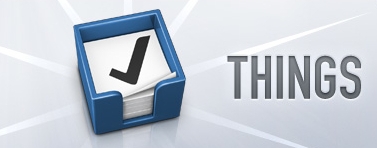If you google the letters “GTD” you’ll get seven million hits back. GTD stands for “Getting Things Done,” a time management book, method and philosophy promoted by David Allen which has spawned a huge array of self-help blogs and task management webservices. Wired magazine described it thus:
Allen’s approach is not inspirational. Instead, it is detailed and dry. But within his advice about how to label a file folder or how many minutes to allot to an incoming email there is a spiritual promise. He says there is a state of blessed calm available to those who have taken careful measure of their habits and made all the changes suggested by reason. Nirvana comes by routine steps, as an algorithm drives a machine.
I have personally found Allen’s approach tremendously beneficial. I don’t think I could get through the week without the Mac OS X application, Things. Things makes it a breeze to implement GTD without having read David Allen’s book. Before Things I relied on a variety of paper lists, my e-mail inbox, files on my desk and my computer desktop, bookmarked webpages, sticky notes, etc. to try to keep track of all the various tasks I was expected to do. Now I immediately file everything into Things and forget about it. Things allows me to distinguish between those tasks which are current, those which are due at some future date, delegated tasks, and tasks which can be put off indefinitely. Related tasks can be grouped into projects, but the design of Things prevents projects from becoming unwieldily. If you need a “sub-project” just create another project and group it in the same “area” or easily attach keywords (“tags”) to link them together.
Task management wasn’t such a big deal for me before, but since I started teaching full time it has become a necessity. Each class I teach requires the logistical planning of a military campaign. On top of that I have numerous administrative duties, and then on my “free time” I’m supposed to do original research and writing. Not to mention producing a feature length film, running a non-profit, and blogging. I haven’t even mentioned trying to negotiate the local medical bureaucracy, taking care of a dog, and the million other things that everyone has to do to get through daily life anywhere, but which are a bit more of a challenge when you aren’t a native speaker of the local language.
For this reason I’ve tried out just about every task-management application or approach I could find. You name it, I’ve tried it: paper-based, Palm OS, online and desktop GTD applications, etc. Then I found Things. Things just works. I don’t have to think about it. I don’t have to spend a lot of time categorizing things or fiddling with tags and categories. The most important thing about such a system is that you trust it. If you don’t have complete faith in your system you won’t use it, or you’ll end up keeping multiple lists. I don’t. My e-mail inbox is completely empty, which is about as close to “a state of blessed calm” as I’ll get.
Despite how beneficial it has been for me personally, I am troubled by GTD and the cult of efficiency which surrounds it. Foucault talks about “technologies of the self” by which he means those “technologies imbued with aspirations for the shaping of conduct in the hope of producing certain desired effects and averting certain undesired ones” (Rose, 1999, cited in Wikipedia). At the end of the nineteenth century, Frederick Taylor developed the theory of “scientific management” which is one of the quintessential technologies of power. GTD is both scientific management for the digital age and a technology of the self for the IT crowd. Rather than having management standing over us with a clock, counting how many seconds it takes us to finish each task, we monitor ourselves by entering each of our daily tasks into a program like Things.
There exists an alternative approach in the slow movement: slow food, slow living, slow travel, and even slow writing. The Slow Manifesto states that “multi-tasking is a moral weakness.” (Also see this TED talk by Carl Honore, a journalist whose popularized the slow living movement.) That’s all well and good. We should all spend time on what’s important. But who has time to do so? Not people working minimum wage who have to hold down two jobs just to make ends meet. I think going slow should be thought of as a right rather than a priviledge. Personally, I’m busy by choice. Or perhaps by genetics. My parents, both in their seventies, still multitask. But I don’t think GTD is necessarily incompatible with slow living. I actually find it easier to take time off to play with the dog when I know exactly what has to be done today, and what can be put off till later.
RELATED: I forgot to mention a recent post on Savage Minds about some of the other tools I recently added to my workflow.

